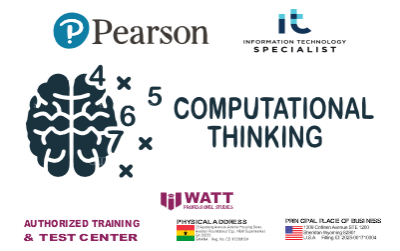COMPUTATIONAL THINKING ITS PEARSON CERTIFICATION

GH₵2500
GH₵3500
his instructor-led Pearson IT Specialist Computational Thinking course focuses on knowledge needed to describe data storage; bits and their storage; representing information in bit patterns; data and programming; data manipulation; arithmetic/logic; programming data manipulation; algorithms; the concept of an algorithm; algorithm representation; algorithm discovery; iterative structures; recursive structures; efficiency and correctness; programming languages; historical perspective of programming languages; traditional programming concepts; procedural units; object-oriented programming; software engineering; the software engineering discipline; the software life cycle; software engineering methodologies; modularity; tools of the trade; quality assurance; documentation; the human-machine interface; data abstractions; basic data structures; related concepts; customized data types; classes and objects; abstract models; database systems; database fundamentals; the relational model; object-oriented databases; traditional file structures; data mining; social impact of database technology; artificial intelligence; intelligence and machines; perception; reasoning; theory of computation; functions and their computation; Turing machines; universal programming languages; a non-computable function; and complexity of problems. Designed for professionals in both non-technical or technical roles, this course focuses on the critical thinking and decision-making skills needed for success at the IT Specialist level.
Learn more
 1
1 